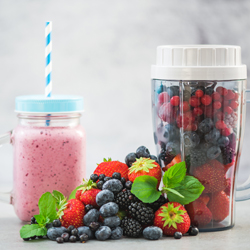March 2022
If you often skip breakfast due to a lack of time or you simply don’t like traditional breakfast foods, a smoothie or a smoothie bowl is a good, quick option. But it’s important that your smoothies are well-balanced with healthy ingredients so your body can truly benefit from them.
Liquids
While liquids, like juice or milk, are not completely necessary for smoothies, adding them does tend to help create a more drinkable option rather than something you’ll need to eat with a spoon. If you decide to add liquids to your smoothie, try to avoid sugary fruit juices and stick to plain, unsweetened alternatives. Non-dairy alternatives like soy, almond, and oat milk are perfect if you are vegan or don’t want to include cow’s milk. Just be sure to avoid versions of these with added sweeteners or flavors. Another liquid option is simply water or ice, which adds zero calories to your smoothie. According to registered dietitian Anna Taylor, when contributing to Cleveland Clinic, you should avoid adding coconut milk to your smoothies, as it is high in saturated fat.
Proteins
Adding protein to your smoothies is vital if you plan on using them as meal replacements or at least as the main portion of your meals. To avoid adding more dairy products to your smoothies, you can opt for powders like whey or pea protein for a boost. Other non-dairy protein options include nuts and nut butters, like peanut or almond, as well as hemp or chia seeds and ground flaxseed. When adding nut butters, be mindful of how much you put into your smoothies, as they can be high in calories. The same goes for ground flaxseed, which is high in fiber and could change your bowel movements significantly if you add a lot right from the start. If none of these options sound appealing, you can choose to add soft or silken tofu, which is mostly flavorless. If all else fails, adding dairy products like plain Greek yogurt will work too.
Fruits
The most flavorful part of smoothies is often the fruit that you add to them. While fruit is tasty, it’s also a great source of antioxidants, vitamins, and minerals. Some great options to include in your smoothies are bananas, cantaloupe, strawberries, grapes, pears, kiwis, apples, raspberries, mangoes, blueberries, oranges, peaches, blackberries, and pineapples. When it comes to berries, Taylor notes, “Raspberries, blueberries, strawberries and other berries add a sweet and tart flavor, and their fiber helps you stay full. Berries also contain antioxidants, which research suggests may have cancer-fighting properties. And because they’re low on the glycemic index, berries won’t spike your blood sugar as quickly as other fruits do.”
Vegetables
Many people struggle to add enough vegetables into their diets, but adding them to smoothies is a great way to sneak them in without realizing they’re even in there. Two of the top options that are low in sugar and calories are spinach and kale, which are high in iron and protein. But you can go beyond making your smoothie green and branch out to options like red beets, carrots, zucchini, cucumber, and cauliflower. Many of these veggies are helpful for those struggling with irritable bowel syndrome as they can help regulate bowel movements and fight inflammation. But it’s always best to consult your physician before making any major changes to your diet.
Adding smoothies into your daily diet is a great way to ensure that you’re getting the necessary nutrients for a healthy lifestyle. Just be sure that what you’re tossing in the blender is actually good for your body.
